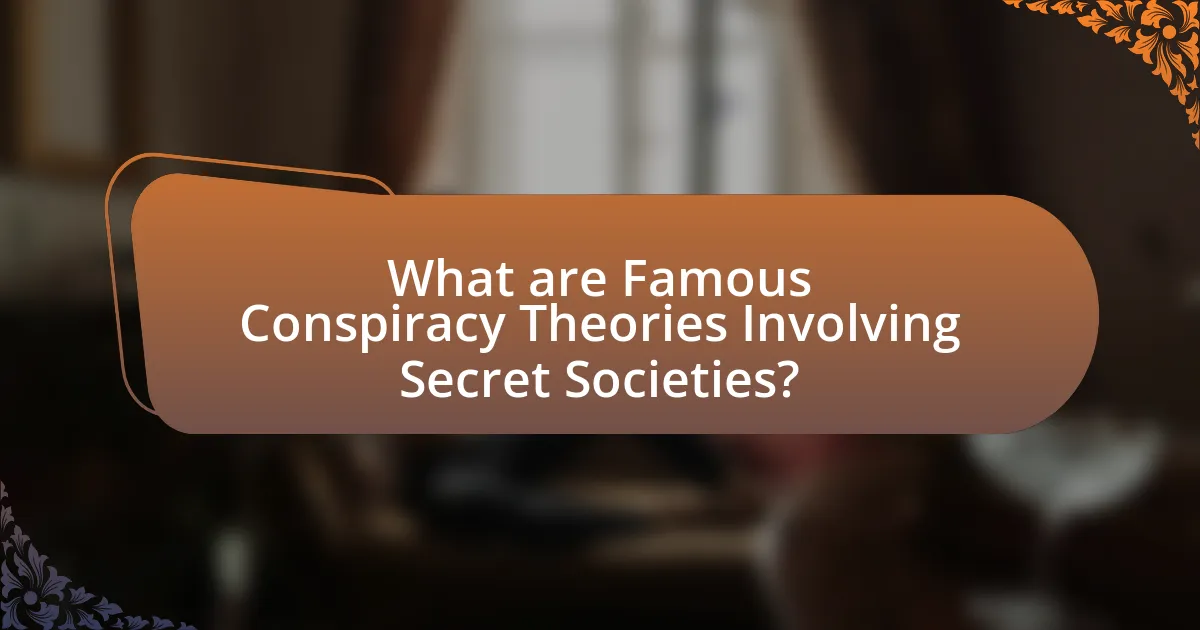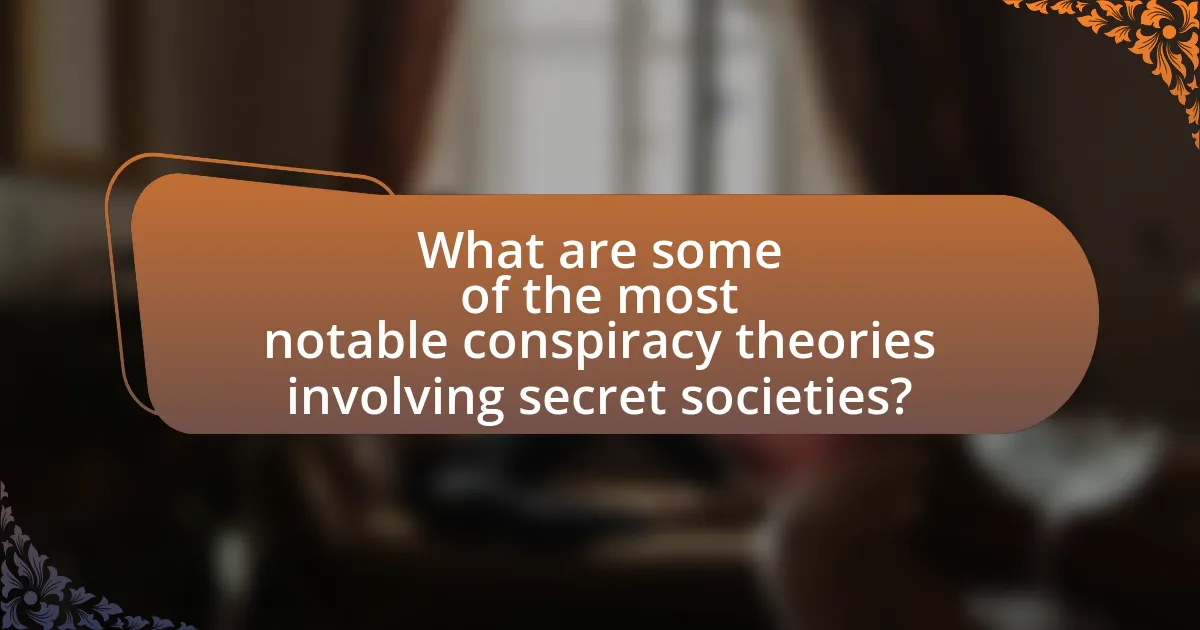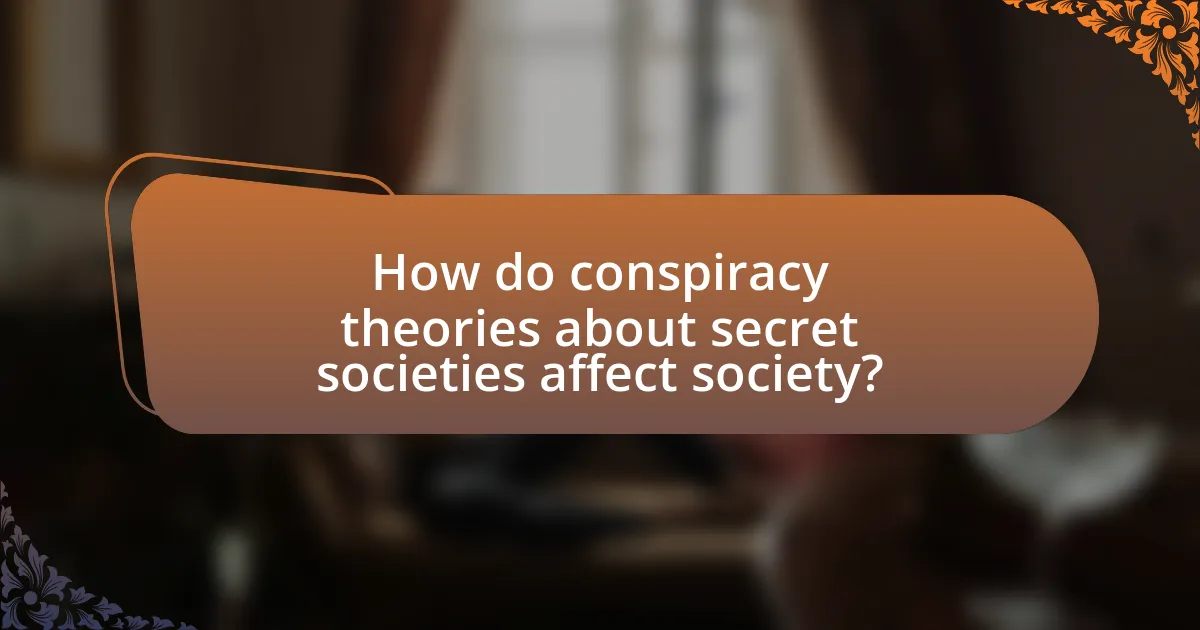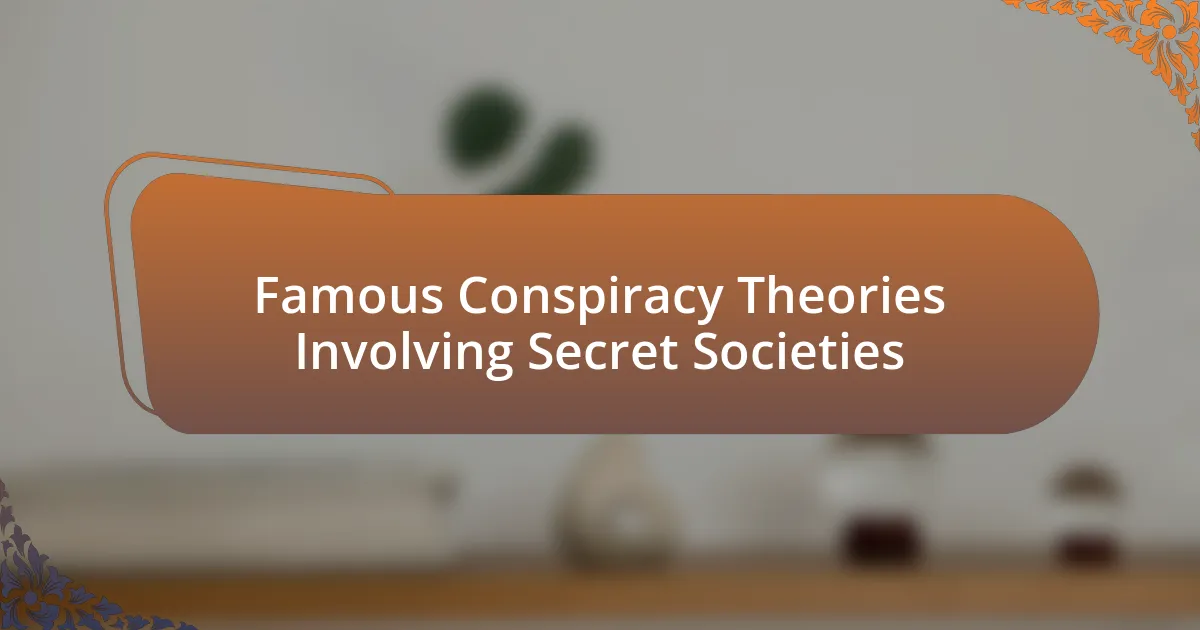Famous conspiracy theories involving secret societies, such as the Illuminati, Freemasons, and Skull and Bones, suggest that these groups manipulate global events and exert control over political and economic systems. The article explores the origins of these theories, highlighting historical events like the formation of the Illuminati in 1776 and the French Revolution, which fueled public speculation about hidden influences. It also examines the psychological and cultural factors that drive belief in these theories, the impact of social media on their spread, and the consequences of such beliefs on societal trust and cohesion. Additionally, the article discusses strategies for critically evaluating these conspiracy theories and the role of education in combating misinformation.

What are Famous Conspiracy Theories Involving Secret Societies?
Famous conspiracy theories involving secret societies include the belief that the Illuminati, a purported group of influential elites, seeks to control world events and establish a New World Order. This theory gained traction in the late 20th century, fueled by various books and media, suggesting that members manipulate governments and economies for their own benefit. Another prominent theory is that Freemasons, a fraternal organization, exert significant influence over political and social institutions, with claims that they orchestrate major historical events from behind the scenes. Additionally, the Skull and Bones society at Yale University is often cited in conspiracy theories, with allegations that its members, including prominent political figures, engage in secretive rituals and decision-making processes that shape U.S. policy. These theories are supported by historical references, such as the founding of the Illuminati in 1776 and the longstanding presence of Freemasonry in Western society, which contribute to their enduring popularity.
How do conspiracy theories about secret societies originate?
Conspiracy theories about secret societies originate from a combination of historical events, societal fears, and the human tendency to seek patterns in complex situations. These theories often emerge during periods of social unrest or political upheaval, where individuals look for explanations for their anxieties. For instance, the rise of the Illuminati conspiracy theory in the late 18th century coincided with the Enlightenment and the subsequent upheaval of traditional power structures, leading people to speculate about hidden influences on government and society. Additionally, the lack of transparency in organizations and the secretive nature of certain groups fuel speculation and distrust, as seen in theories surrounding the Freemasons and their alleged control over political systems.
What historical events have contributed to these conspiracy theories?
Historical events that have contributed to conspiracy theories involving secret societies include the formation of the Illuminati in 1776, which aimed to promote Enlightenment ideals but was perceived as a threat to established power structures. The French Revolution (1789-1799) further fueled fears of secretive groups manipulating political outcomes, as many believed that the revolution was orchestrated by hidden elites. Additionally, the rise of Freemasonry in the 18th century, often associated with influential figures, led to suspicions of a clandestine agenda influencing global affairs. The assassination of President John F. Kennedy in 1963 also intensified conspiracy theories, with many attributing his death to secretive organizations rather than a lone gunman, reflecting a broader distrust of government narratives. These events illustrate how significant historical moments can shape public perception and foster conspiracy theories surrounding secret societies.
How do cultural factors influence the perception of secret societies?
Cultural factors significantly influence the perception of secret societies by shaping beliefs, values, and historical narratives surrounding them. For instance, in cultures with a strong emphasis on collectivism, secret societies may be viewed as protective groups that foster community and shared goals, while in individualistic cultures, they might be perceived as elitist or exclusionary. Additionally, historical events, such as revolutions or political upheavals, can color perceptions; for example, in the United States, the Freemasons are often seen as a foundational group in the nation’s history, whereas in other contexts, they may be associated with conspiracy and manipulation. This duality illustrates how cultural context can lead to vastly different interpretations of the same organization, reinforcing the idea that perceptions of secret societies are not universal but rather deeply embedded in cultural narratives and societal experiences.
Why do people believe in conspiracy theories related to secret societies?
People believe in conspiracy theories related to secret societies due to a combination of psychological, social, and cultural factors. Psychological research indicates that individuals often seek patterns and explanations for complex events, leading them to embrace conspiracy theories as a way to make sense of uncertainty and chaos. For instance, a study published in the journal “Personality and Individual Differences” found that individuals with higher levels of paranoia and lower trust in others are more likely to endorse conspiracy beliefs. Socially, these theories can provide a sense of belonging to a group that shares similar beliefs, reinforcing their validity among like-minded individuals. Culturally, narratives surrounding secret societies often tap into historical fears and mistrust of authority, making them more appealing. The combination of these factors creates an environment where conspiracy theories thrive, as they offer simple explanations for complex realities.
What psychological factors drive belief in these theories?
Belief in conspiracy theories involving secret societies is primarily driven by cognitive biases, social identity, and a need for control. Cognitive biases, such as the proportionality bias, lead individuals to perceive significant events as being caused by powerful groups rather than random occurrences. Social identity theory suggests that people align with groups that share their beliefs, reinforcing their commitment to these theories. Additionally, the need for control and understanding in an uncertain world drives individuals to seek explanations that provide a sense of order, often found in conspiracy narratives. Research indicates that individuals who feel powerless or marginalized are more likely to endorse conspiracy theories, as these beliefs can offer a framework for understanding their experiences.
How does social media impact the spread of these conspiracy theories?
Social media significantly accelerates the spread of conspiracy theories by providing a platform for rapid information dissemination and community building among like-minded individuals. The algorithms used by platforms like Facebook and Twitter often prioritize sensational content, which can lead to increased visibility for conspiracy theories. A study published in the journal “Science” found that false news stories are 70% more likely to be retweeted than true stories, illustrating how misinformation can gain traction quickly. Additionally, social media allows for the formation of echo chambers, where users are exposed primarily to viewpoints that reinforce their beliefs, further entrenching conspiracy theories within specific communities.

What are some of the most notable conspiracy theories involving secret societies?
Some of the most notable conspiracy theories involving secret societies include the Illuminati, Freemasons, and the Skull and Bones society. The Illuminati is often cited as a powerful group allegedly controlling world events from behind the scenes, with claims of their influence in politics and entertainment. The Freemasons, a fraternal organization, are frequently accused of having hidden agendas and exerting control over governments and economies. The Skull and Bones society, based at Yale University, is rumored to include influential leaders and is often linked to theories about elite power structures in the United States. These theories are supported by historical references, such as the founding of the Illuminati in 1776 and the secretive nature of these organizations, which fuels speculation about their true intentions and influence.
Which secret societies are most commonly associated with conspiracy theories?
The secret societies most commonly associated with conspiracy theories include the Freemasons, the Illuminati, and the Skull and Bones. The Freemasons are often linked to theories about global influence and control, stemming from their historical secrecy and elite membership. The Illuminati, originally a Bavarian secret society founded in 1776, is frequently cited in conspiracy theories regarding a supposed New World Order aiming for global domination. Skull and Bones, a secret society at Yale University, is associated with theories about political and economic power due to its notable alumni, including several U.S. presidents. These associations are reinforced by historical contexts and the societies’ secretive natures, which fuel speculation and intrigue.
What role does the Freemasons play in conspiracy theories?
The Freemasons are often portrayed as central figures in various conspiracy theories, primarily due to their secretive nature and historical influence. These theories typically suggest that the Freemasons manipulate global events, control governments, and maintain power through clandestine networks. For instance, the belief that Freemasons orchestrated the American Revolution stems from their involvement in Enlightenment ideals and the founding of the United States, which conspiracy theorists argue reflects a hidden agenda for world domination. Additionally, the Freemasons’ use of symbols, such as the Eye of Providence, fuels speculation about their supposed connections to other secret societies and occult practices. This combination of secrecy, historical significance, and symbolism contributes to their prominent role in conspiracy narratives.
How is the Illuminati depicted in popular culture?
The Illuminati is depicted in popular culture as a secret society that manipulates global events and controls influential figures. This portrayal often emphasizes themes of conspiracy, power, and hidden knowledge, suggesting that the Illuminati orchestrates significant political and social changes from behind the scenes. For instance, films like “The Da Vinci Code” and “National Treasure” incorporate the Illuminati as a central element of their plots, reinforcing the idea of a clandestine organization with vast influence. Additionally, music artists, such as Jay-Z and Beyoncé, have been accused of referencing the Illuminati in their work, further embedding the concept into mainstream media. This depiction aligns with historical references to the Bavarian Illuminati, founded in 1776, which aimed to promote Enlightenment ideals but has since evolved into a symbol of conspiracy theories in contemporary culture.
What are the key conspiracy theories linked to these secret societies?
Key conspiracy theories linked to secret societies include the belief that the Freemasons control world governments, the idea that the Illuminati manipulate global events to establish a New World Order, and the theory that the Skull and Bones society influences U.S. politics and leadership. These theories often stem from historical events and the secretive nature of these organizations, leading to speculation about their influence on major political and social changes throughout history. For instance, the Freemasons have been accused of orchestrating the American Revolution, while the Illuminati is frequently cited in discussions about elite control over financial systems and media.
How does the theory of a New World Order relate to secret societies?
The theory of a New World Order (NWO) posits that a secretive elite is conspiring to control global affairs, which directly relates to secret societies as they are often perceived as the orchestrators of this agenda. Secret societies, such as the Illuminati and Freemasons, are frequently cited in NWO theories as groups that allegedly manipulate political and economic systems to establish a totalitarian global government. Historical events, like the formation of the United Nations and the establishment of various international organizations, are interpreted by conspiracy theorists as steps toward this centralized control, often attributing these developments to the influence of secret societies.
What is the significance of the Bohemian Grove in conspiracy theories?
The Bohemian Grove is significant in conspiracy theories primarily due to its association with powerful political and business leaders who gather there annually for secretive meetings. This exclusivity and the rituals performed, such as the “Cremation of Care,” fuel speculation about the group’s influence on global decision-making and the existence of a hidden elite. The Grove’s history, dating back to 1872, and its location in California’s redwood forest add to the mystique, leading theorists to suggest that it serves as a site for clandestine planning and networking among the world’s most influential figures.

How do conspiracy theories about secret societies affect society?
Conspiracy theories about secret societies significantly affect society by fostering distrust in institutions and promoting social division. These theories often lead individuals to question the legitimacy of governments, media, and other authoritative entities, which can result in decreased civic engagement and increased polarization among different social groups. For instance, a study published in the journal “Political Psychology” found that belief in conspiracy theories correlates with lower trust in political institutions and higher levels of political cynicism. This erosion of trust can hinder effective governance and social cohesion, as communities become fragmented by differing beliefs about reality and truth.
What impact do these theories have on public perception of real organizations?
Conspiracy theories involving secret societies significantly shape public perception of real organizations by fostering distrust and suspicion. These theories often portray organizations as manipulative entities with hidden agendas, leading the public to question their transparency and motives. For instance, the belief in the Illuminati’s influence on global events has caused many to view political and financial institutions as untrustworthy, impacting their credibility and public support. Research indicates that exposure to conspiracy theories can lead to a decrease in trust in institutions, as seen in studies published in the journal “Political Psychology,” which highlight how such theories can alter individuals’ perceptions of authority and legitimacy.
How can conspiracy theories lead to distrust in institutions?
Conspiracy theories can lead to distrust in institutions by promoting the belief that these organizations are engaged in deceptive or harmful practices. When individuals encounter conspiracy theories, they often perceive institutions, such as governments or corporations, as untrustworthy and manipulative. Research indicates that exposure to conspiracy theories can significantly decrease trust in public institutions; for example, a study published in the journal “Political Psychology” found that individuals who believe in conspiracy theories are more likely to distrust government actions and policies. This erosion of trust can result in decreased civic engagement and increased polarization within society, as people become more inclined to reject official narratives and rely on alternative sources of information.
What are the potential consequences of believing in these theories?
Believing in conspiracy theories involving secret societies can lead to significant social and psychological consequences. Individuals may experience increased distrust in institutions and authorities, which can undermine social cohesion and promote divisiveness within communities. Research indicates that belief in such theories can correlate with heightened anxiety and paranoia, as individuals may feel threatened by perceived hidden agendas. Furthermore, these beliefs can result in real-world actions, such as participation in extremist groups or movements, which can escalate into violence or civil unrest, as seen in various historical instances where conspiracy beliefs fueled radical behavior.
How can individuals critically evaluate conspiracy theories involving secret societies?
Individuals can critically evaluate conspiracy theories involving secret societies by applying a systematic approach that includes fact-checking, analyzing sources, and assessing the plausibility of claims. Fact-checking involves verifying the accuracy of the information presented in the theory against credible sources, such as academic research or reputable news outlets. Analyzing sources requires individuals to consider the credibility of the authors and the context in which the information was published, as many conspiracy theories rely on anecdotal evidence or biased reporting. Assessing plausibility involves evaluating whether the claims made in the conspiracy theory are logically consistent and whether they align with established facts, such as historical events or scientific understanding. For example, the theory that the Illuminati controls world events lacks credible evidence and contradicts documented historical facts about the organization’s actual influence and activities.
What strategies can help discern fact from fiction in these theories?
To discern fact from fiction in conspiracy theories involving secret societies, one effective strategy is to critically evaluate the sources of information. Reliable sources, such as peer-reviewed journals or reputable news organizations, provide evidence-based reporting, while dubious sources often lack transparency and credibility. For instance, a study published in the journal “Psychological Science” by Karen M. M. M. van Prooijen and others highlights that individuals are more likely to believe conspiracy theories when they rely on unverified information. Additionally, cross-referencing claims with established facts and expert opinions can further clarify the validity of the theories. This approach helps to separate substantiated claims from unfounded speculation, reinforcing the importance of critical thinking in evaluating such narratives.
How can education play a role in combating misinformation about secret societies?
Education can play a crucial role in combating misinformation about secret societies by promoting critical thinking and media literacy skills. By teaching individuals how to evaluate sources, discern credible information from false claims, and understand the historical context of secret societies, education empowers people to question sensationalized narratives. Research indicates that individuals with strong media literacy skills are less likely to believe in conspiracy theories, as they can identify logical fallacies and recognize biased information. For instance, a study published in the journal “Communication Research” found that educational interventions significantly reduced belief in conspiracy theories among participants. Thus, education serves as a foundational tool in equipping individuals with the necessary skills to navigate and challenge misinformation surrounding secret societies.
